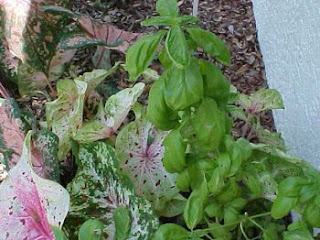Have you planted an herb garden? Most herbs grow to be years old, and only quit growing if they are allowed to bolt (or flower), or if it becomes too cold for them to comfortably produce new stems. Herbs need to be "pruned" much as grass requires cutting.
Here is a photo of our sad Herb Garden at its worst right during winter. Most of these herbs are 4-5 years old. They will be given a shave and a trim, a little new soil and soon they will be all beautiful again. These herbs grow in a mostly sunny place with afternoon shade.
Usually, folks in Spring Hill, or residents south of Brooksville, do not encounter frost and freezes like we do in our pocket of northeast Brooksville.
This is what the herb garden resembles by June. We are growing more varieties this year, so it will be fun to see how the herb garden looks this June. Lots of lush bunches will bring those wonderful aromas to our kitchen throughout the summer and autumn months... until the first frost.
Herbs add interesting flavors to our foods, provide garnish to meals (making them "prettier" so our families feel every meal is extra special), and may be used in floral arrangements. Dry your own herbs, or freeze them when they are plentiful. Create "herb bouquets" by tying them together and placing them in the pot when making soups or stews. Herbs like Parsley and Basil help freshen the breath and clean teeth. It's one reason they used to be offered on plates in palaces, so guests could "freshen up" by chewing a few leaves.
Basil and Caladiums
|
Herbs are fantastic container growers. They give off rich aromas, and complement one another with their textures and colors. We have found that Basil is an herb which requires warm temperatures, but all the others seem to weather winter well. Sometimes they need a little help with a blanket for protection from frost. Our Basil winters in the garage with some other plants.
Growing Herbs:
Potted Herbs can be grown indoors or out. Quickly spreading out in large pots, herbs are compatible with most other plants and often help repel pests.
Best grown in semi-sunny areas, herbs like being pruned frequently and taste best when freshly cut. We step outside to grab a handful of parsley, basil and other herbs whenever we like for a delicious addition to cold salads, pasta salads, side dishes, zesty homemade dressings, under the skin of roasted poultry, potato dishes, breads, rice sides and more!
Herbs enjoy fertilizer, but don't require much. We usually make "teas" from natural substances like cow pies. For quick and easy fertilizing, we resort to store brands.
Florida Growing Conditions: Preferring not to be overwatered, herbs enjoy semi-sun conditions, rather than full day direct sunlight. If one or two stems grow longer than the others, be sure to prune that one so that bushier growth is stimulated.
Because most insects and some pesky rodents don't like herbs, it is suggested to plant herbs around vegetables and flowers as a deterrent.
Canadian Living offers the following pest control advice:
Some top performers
1. Anise, near coriander, helps deter aphids, snails and slugs; coriander, itself, helps keep aphids, Colorado potato beetle and spider mites at bay.
1. Anise, near coriander, helps deter aphids, snails and slugs; coriander, itself, helps keep aphids, Colorado potato beetle and spider mites at bay.
2. Basil, beside tomatoes, improves the growth and flavour of the fruit and repels tomato hornworms and thrips (not to mention that the basil and tomatoes will be handy for pasta sauce).
3. Borage attracts bees that pollinate tomatoes, squash and strawberries, but puts off cabbage and tomato worms.
4. Catnip helps keep ants, aphids, flea beetles, Japanese beetles, squash bugs and even mice out of flowerbeds, but keeps your kitty happy.
5. Chives, close by, improve the taste of carrots and tomatoes, and help deter aphids on sunflowers and tomatoes, reduce black spot on roses and control apple scab.
6. Dill is a repellant for aphids, cabbage moths and spider mites, and a food source for the larvae of beautiful swallowtail butterflies.
7. Garlic, among raspberry and rose canes, helps prevent disease and repels aphids, coddling moths, Japanese beetles and root maggots.
8. Lavender attracts beneficial pollinators, such as bees and butterflies, but it helps keep mice, mosquitoes, moths, rabbits and ticks away.
9. Mint (watch its invasive tendencies!) is a great companion for cabbage and tomato plants since it helps repel ants, cabbage moths, flea beetles and rodents.
8. Lavender attracts beneficial pollinators, such as bees and butterflies, but it helps keep mice, mosquitoes, moths, rabbits and ticks away.
9. Mint (watch its invasive tendencies!) is a great companion for cabbage and tomato plants since it helps repel ants, cabbage moths, flea beetles and rodents.
10. Oregano -- an amigo to broccoli, cabbage and cauliflower -- protects against cabbage butterfly and scares away cucumber beetles.
11. Rue has the reputation of discouraging dogs and cats, as well as aphids, onion maggots, slugs, snails and Japanese beetles.
12. Thyme, last but not least, is a longtime enemy of cabbage worms.
Enjoy your herbs! Place them in pretty pots on your porch, lanai, or window sill where you will not only find them convenient for cooking, but also be able to enjoy their delicious aroma when passing by. Don't hesitate lightly touching your herbs. They will reciprocate by releasing lovely scents in the air and on your fingertips.





No comments:
Post a Comment